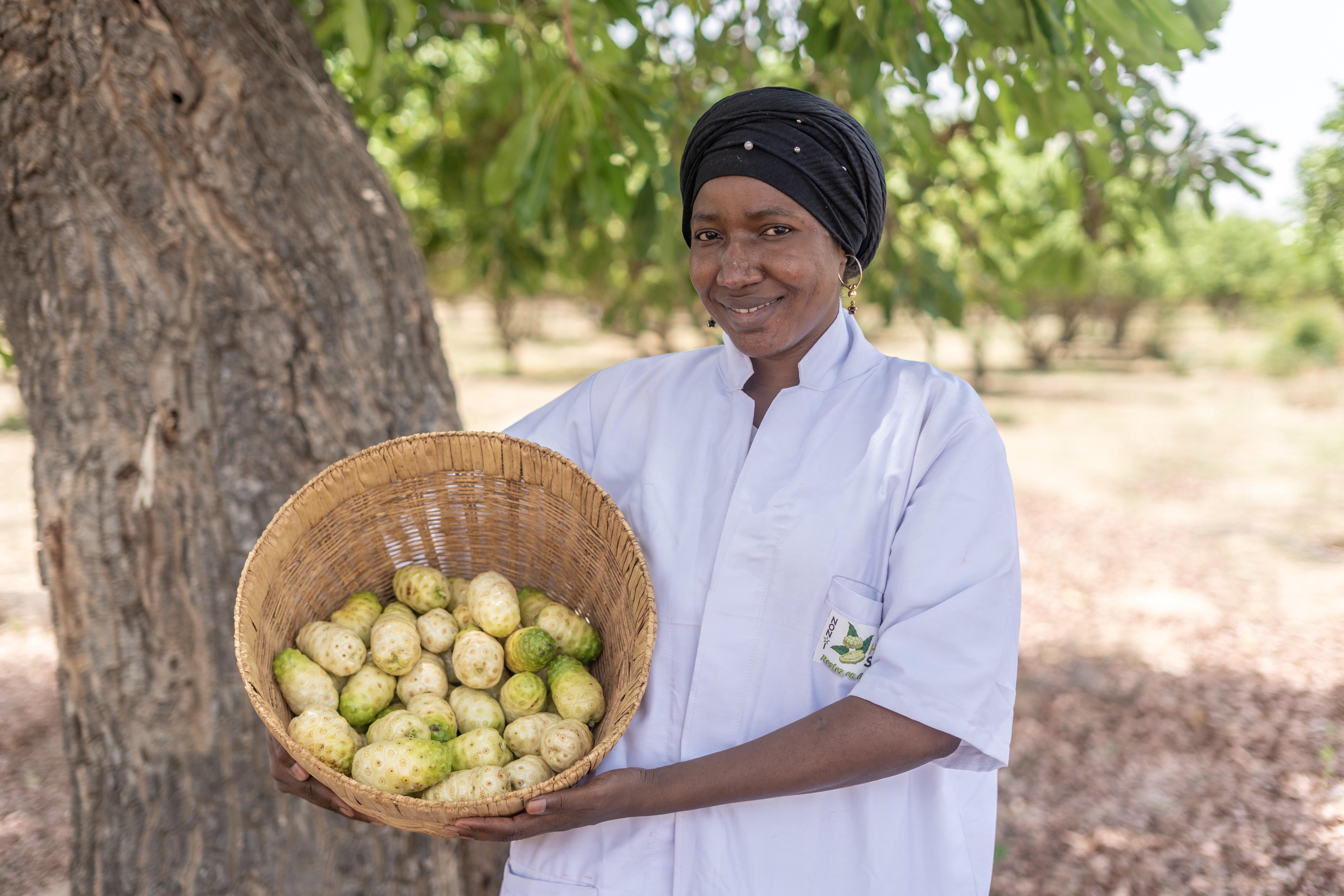Under the scorching Sahelian sun during the dry season, with a scarf tied around her head and a wicker basket in her arms, Safoura Cissé tirelessly repeats the same actions. She walks up to a tree, bends down, and picks up the fresh and highly fragrant fruits that have fallen to the ground before storing them.
Safoura Cissé, Queen of Noni for a Virtuous Agro-Industry
August 12, 2024

Mali
An Uncommon Plant with Multiple Potentials
The young woman has chosen to cultivate a unique plant in her two-hectare field on the outskirts of Ségou, located approximately 240 kilometres east of Bamako, the Malian capital. The Morinda Citrifolia, commonly known as Noni, is a shrub that can tower up to six meters in height and yields an abundant supply of ovoid fruits, boasting a light green hue akin to a petite avocado. These fruits contain a high concentration of vitamins, minerals, enzymes, alkaloids, amino acids, and antioxidants.
For the 26-year-old Malian woman, who has always been passionate about the land, it all started in 2019. The plant is traditionally recommended and consumed for its numerous antibacterial, antiviral, antifungal, anti-inflammatory, and healing properties. Safoura then launched "Health Secret"—an enterprising venture dedicated to the production, transformation, and commercialization of Noni.
"Beyond the inherent potential of the plant and its fruit, my vision was to create a value-added product within a structure that has a social impact, in order to contribute to the improvement of the food and nutritional situation of the population. Our sphere action converges at the intersection of agri-food and healthcare."Safoura Cissé, President of Health Secret Mali
In Mali, malnutrition and food insecurity have exacted a grievous toll, amounting to cumulative losses of approximately 266 billion CFA francs annually—a staggering 4.06% of the nation's GDP—as revealed by the Malian Office of the UNDP's seminal study on the cost of hunger conducted in 2017). The study also emphasizes that credible alternative solutions with strong socio-economic and environmental impacts must be considered to support national policies and strategies against food and nutritional insecurity.
Creating an Enabling Environment for Youth Entrepreneurship and Employment
Safoura's project swiftly garnered the endorsement of international partners who provided support for its growth. In 2021, she received seed funding of USD2,500, equivalent to nearly 1,500,000 CFA francs, through the "Youth Entrepreneurship" programme led by the UNDP and the Tony Elumelu Foundation (TEF). This programme, initiated in 2020, aims to empower 10,000 young people through entrepreneurial capacity-building, financial support for startup ventures to create or strengthen innovative enterprises, assistance to community-led businesses, and individual mentoring for youth to help their businesses grow. The programme targets 40% of young women.
The funding allocated to Safoura enabled her to establish a small processing and packaging unit for her Noni production. As a result, the young entrepreneur's company specializes in producing juice and powder, among the various by-products of the fruit.
"We have already succeeded in creating 5 full-time jobs and 7 part-time jobs for local young people. This helps reduce poverty and unemployment. Now, our processing unit requires additional equipment and materials to enhance production, expand the business, and continue our mission," Safoura advocates.
An Economic, Environmental, and Solidarity-driven Ambition
Beyond her unyielding determination, Safoura Cissé exemplifies intellectual prowess. She holds a master's degree in English and Arabic from the Faculty of Letters, Languages, and Linguistics at the University of Bamako and a bachelor's degree in management obtained from the Institute of Higher Studies in Management (IHEM) in the capital.
Aware of the environmental challenges and the need for responsible agro-agriculture, Safoura has equipped her production site in the village of Banakoro with a micro-jet irrigation system to optimize water usage and has started to embrace 100% organic practices.
Her ambition for the future? To make her company the first West African factory for Noni processing into juice and powder, exclusively powered by renewable energy sources by 2025.

 Locations
Locations



